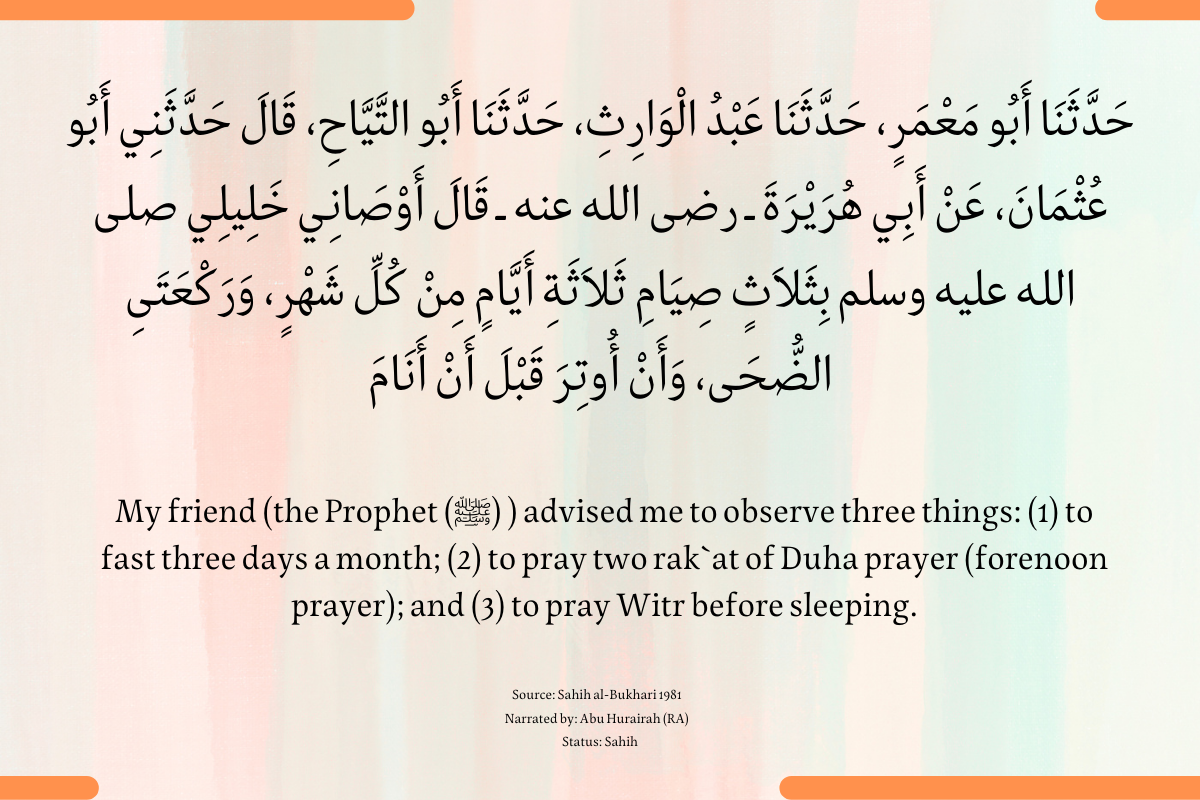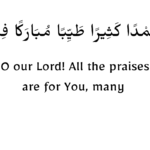بِسْمِ ٱللَّٰهِ ٱلرَّحْمَٰنِ ٱلرَّحِيمِ
Making Dua is a form worship for the believers in the Islamic religion. We are encourage to supplicate in all sorts of time whether in facing adversity or at times of peace. Prophet Muhammad (ﷺ) taught us the proper supplication etiquette in prayer too.
In Salat there are two places to make Dua. One is during Sujud or the prostration and the other is before giving the Salam to end the Salat.
Hadith Regarding the Proper Supplication Etiquette In Prayer
There are two Hadiths which narrates the etiquette of supplication during prayer. One is graded as Sahih (authentic) by al-Albani and the other is graded as Hasan. Let’s take a look at those two Hadiths below:
حَدَّثَنَا أَحْمَدُ بْنُ حَنْبَلٍ، حَدَّثَنَا عَبْدُ اللَّهِ بْنُ يَزِيدَ، حَدَّثَنَا حَيْوَةُ، أَخْبَرَنِي أَبُو هَانِئٍ، حُمَيْدُ بْنُ هَانِئٍ أَنَّ أَبَا عَلِيٍّ، عَمْرَو بْنَ مَالِكٍ حَدَّثَهُ أَنَّهُ، سَمِعَ فَضَالَةَ بْنَ عُبَيْدٍ، صَاحِبَ رَسُولِ اللَّهِ صلى الله عليه وسلم يَقُولُ سَمِعَ رَسُولُ اللَّهِ صلى الله عليه وسلم رَجُلاً يَدْعُو فِي صَلاَتِهِ لَمْ يُمَجِّدِ اللَّهَ تَعَالَى وَلَمْ يُصَلِّ عَلَى النَّبِيِّ صلى الله عليه وسلم فَقَالَ رَسُولُ اللَّهِ صلى الله عليه وسلم ” عَجِلَ هَذَا ” . ثُمَّ دَعَاهُ فَقَالَ لَهُ أَوْ لِغَيْرِهِ ” إِذَا صَلَّى أَحَدُكُمْ فَلْيَبْدَأْ بِتَحْمِيدِ رَبِّهِ جَلَّ وَعَزَّ وَالثَّنَاءِ عَلَيْهِ ثُمَّ يُصَلِّي عَلَى النَّبِيِّ صلى الله عليه وسلم ثُمَّ يَدْعُو بَعْدُ بِمَا شَاءَ ” .
The Messenger of Allah (ﷺ) heard a person supplicating during prayer. He did not mention the greatness of Allah, nor did he invoke blessings on the Prophet (ﷺ).
The Messenger of Allah (ﷺ) said: He made haste.
He then called him and said either to him or to any other person: If any of you prays, he should mention the exaltation of his Lord in the beginning and praise Him; he should then invoke blessings on the Prophet (ﷺ); thereafter he should supplicate Allah for anything he wishes.
Source: Sunan Abi Dawud 1481
Narrated by: Fudalah ibn Ubayd (RA). Graded Sahih by al-Albani
حَدَّثَنَا مَحْمُودُ بْنُ غَيْلاَنَ، حَدَّثَنَا عَبْدُ اللَّهِ بْنُ يَزِيدَ الْمُقْرِئُ، حَدَّثَنَا حَيْوَةُ بْنُ شُرَيْحٍ، حَدَّثَنِي أَبُو هَانِئٍ الْخَوْلاَنِيُّ، أَنَّ عَمْرَو بْنَ مَالِكٍ الْجَنْبِيَّ، أَخْبَرَهُ أَنَّهُ، سَمِعَ فَضَالَةَ بْنَ عُبَيْدٍ، يَقُولُ سَمِعَ النَّبِيُّ صلى الله عليه وسلم رَجُلاً يَدْعُو فِي صَلاَتِهِ فَلَمْ يُصَلِّ عَلَى النَّبِيِّ صلى الله عليه وسلم فَقَالَ النَّبِيُّ صلى الله عليه وسلم ” عَجِلَ هَذَا ” . ثُمَّ دَعَاهُ فَقَالَ لَهُ أَوْ لِغَيْرِهِ ” إِذَا صَلَّى أَحَدُكُمْ فَلْيَبْدَأْ بِتَحْمِيدِ اللَّهِ وَالثَّنَاءِ عَلَيْهِ ثُمَّ لِيُصَلِّ عَلَى النَّبِيِّ صلى الله عليه وسلم ثُمَّ لِيَدْعُ بَعْدُ بِمَا شَاءَ ” . قَالَ أَبُو عِيسَى هَذَا حَدِيثٌ حَسَنٌ صَحِيحٌ .
“The Prophet (ﷺ) heard a man supplicating in his Salat but he did not send Salat upon the Prophet (ﷺ), so the Prophet (ﷺ) said: ‘This one has rushed.’
Then he called him and said to him, or to someone other than him: ‘When one of you performs Salat, then let him begin by expressing gratitude to Allah and praising Him.
Then, let him send Salat upon the Prophet (ﷺ), then let him supplicate after that, whatever he wishes.’”
Source: Jami` at-Tirmidhi 3477
Narrated by: Amr bin Malik Al-Janbi (RA)
Based on the two Hadiths above, the proper method to make Dua in prayer is by exalting Allah first. Then we should recite blessings to Prophet Muhammad (ﷺ). After that we may continue to supplicate to ask for our needs and wants to Allah S.W.T.
Following this sequential approach as advised by the Rasul (ﷺ) enriches the our supplication, instills humility and sincerity. Furthermore, InsyaAllah by following the Prophet’s recommendation, our Dua shall be accepted by Allah.
Quranic Verse About Dua
In Surah al-Ghafir (The Forgiver), ayah 60, Allah has promised to respond to your Dua. InsyaAllah by following the proper etiquette of supplication, your Dua shall be responded if not now, it shall be later in the future. Allah knows what you need better than you know yourself.

Avoid Rushing When Making Dua
Rushing through supplications diminishes sincerity. Neglecting the exaltation of Allah and blessings upon the Prophet compromises the essence of the prayer. Emphasizing sincerity as a crucial component highlights the importance of intention in supplication.
Benefits of Proper Supplication Etiquette
Strengthening the spiritual connection elevates the prayer experience. Cultivating humility and gratitude fosters a deeper appreciation for the divine. Seeking the pleasure and mercy of Allah becomes the ultimate goal, leading to a more fulfilling spiritual journey.
Can I Supplicate During Sujud Using Other Languages Other Than Arabic?
According to Sheikh Assim al-Hakeem you can make Dua during Sujud in your native language if you do not know or have little mastery in Arabic. Some other scholars advise to avoid it as it will invalidate your Salat.
I myself choose the second opinion just to be careful and I try to memorize the Duas in Arabic to supplicate during Sujud. If you are unable to memorize in Arabic then the first method is sufficient. May Allah forgive our shortcomings and accept our Dua and Salat.
Conclusion
In conclusion, the Hadith serves as a timeless guide, reminding us of the transformative power embedded in the proper etiquette of supplication.
As we strive to incorporate these teachings into our prayers, we unlock a profound connection with the divine, making each supplication a moment of spiritual significance. Let us embark on this journey to enrich our prayer lives and draw closer to the mercy and blessings of Allah.
As always, do share this piece of article out to all of your family and friends. May it be one of the long lasting good deeds that rewards us well. Here in this world and in the hereafter, InsyaAllah.













